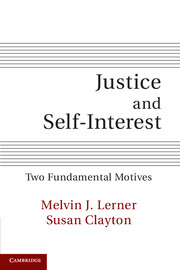Book contents
- Frontmatter
- Contents
- List of Figures and Tables
- Preface
- 1 Contesting the Primacy of Self-Interest
- 2 Why Does Justice Matter? The Development of a Personal Contract
- 3 Commitment to Justice: The Initial Primary Automatic Reaction
- 4 Explaining the Myth of Self-Interest
- 5 Defining the Justice Motive: Reintegrating Procedural and Distributive Justice
- 6 How People Assess Deservingness and Justice: The Role of Social Norms
- 7 Integrating Justice and Self-Interest: A Tentative Model
- 8 Maintaining the Commitment to Justice in a Complex World
- 9 Bringing It Closer to Home: Justice in Another “American Tragedy”
- 10 Emotional Aftereffects: Some Negative Consequences and Thoughts on How to Avoid Them
- References
- Author Index
- Subject Index
8 - Maintaining the Commitment to Justice in a Complex World
Published online by Cambridge University Press: 03 May 2011
- Frontmatter
- Contents
- List of Figures and Tables
- Preface
- 1 Contesting the Primacy of Self-Interest
- 2 Why Does Justice Matter? The Development of a Personal Contract
- 3 Commitment to Justice: The Initial Primary Automatic Reaction
- 4 Explaining the Myth of Self-Interest
- 5 Defining the Justice Motive: Reintegrating Procedural and Distributive Justice
- 6 How People Assess Deservingness and Justice: The Role of Social Norms
- 7 Integrating Justice and Self-Interest: A Tentative Model
- 8 Maintaining the Commitment to Justice in a Complex World
- 9 Bringing It Closer to Home: Justice in Another “American Tragedy”
- 10 Emotional Aftereffects: Some Negative Consequences and Thoughts on How to Avoid Them
- References
- Author Index
- Subject Index
Summary
A common fact of living in a complex society is the prevalence of instances in which people perceive themselves as well as others to be denied what they deserve, or to suffer unjustly. These implicit, and often explicit, threats to their commitment to justice require people to defuse and manage the incessant input of new instances in ways that enable them to continue functioning. How do they do this? Typically, additional processes come into play suggesting the appearance of a third stage: Time 3.
Given the human cognitive equipment it is no surprise that most people, certainly by adulthood, acquire a repertoire of prepared responses to familiar forms of injustice. Although they may have other functions as well, these responses appear to be designed to denature threats to people's confidence that they live in a world in which people get what they deserve. Justice prevails. Even among those who have a well-rehearsed full repertoire of available prepared responses, there will almost inevitably be events and circumstances that automatically elicit the emotional reactions to the preconscious recognition of an injustice (see, e.g., Montada, Schmidt, and Dalbert, 1986, on “existential guilt”). The vast majority do adapt, more or less successfully – at least for most of the time, but probably not for all the time and all the occasions when an unanticipated compelling emotional reaction emerges.
The general culture, as well as various subcultures, provides ample material for several prepared solutions.
Information
- Type
- Chapter
- Information
- Justice and Self-InterestTwo Fundamental Motives, pp. 191 - 206Publisher: Cambridge University PressPrint publication year: 2011
